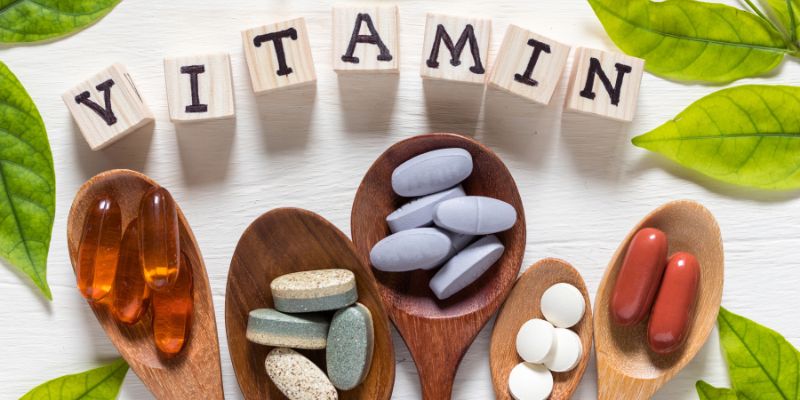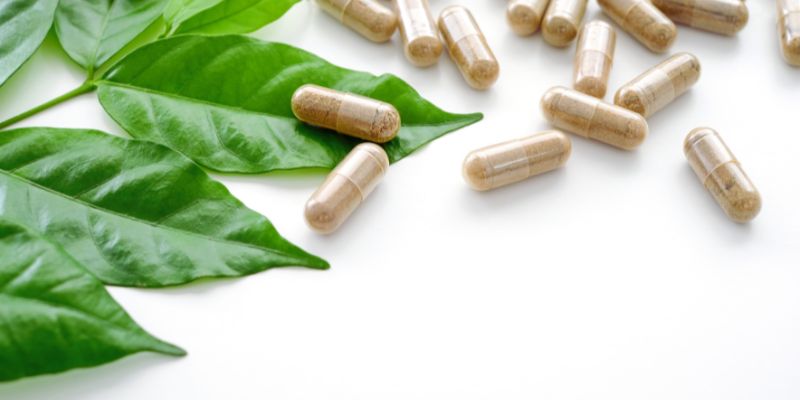Which Are The Best Vitamins For Your Eyes Health And Vision: A Guide
Your eyes are one of your most vital senses; preserving their health should be the first concern. Whether your age-related vision problems cause concern or you spend hours gazing at displays, the right diet can make all the difference. Some vitamins can help guard your eyes, sharpen your eyesight, and even ward off major diseases! Regularly consuming particular vitamins might improve your eye condition and even your eyesight over time.
If you seek natural means of supporting your vision and preventing eye strain, you are in the right place. This guide will review the finest vitamins for eye health, their functions, and their advantages. Just a few basic diet changes will help you safeguard your eyes over time and experience better, sharper vision.

Best Eye Vitamins For Blurry Vision
These are the best vitamins for your eyes you can take:
Vitamin A: Essential for Good Vision
Among the vitamins your eyes depend on most is vitamin A. In low light, it is vital for optimal eyesight and helps guard the eye's surface, the cornea. Night blindness, dry eyes, and even cornea damage can all result from a vitamin A shortfall. This vitamin also helps the retina, which is crucial for turning light into signals the brain uses. Foods heavy in vitamin A include kale, sweet potatoes, carrots, and spinach. Animal sources of it include also liver, eggs, and dairy products. Those who might not obtain enough from their food will find getting vitamin A via supplements simpler. Regular vitamin A intake helps you see better and guards your eyes from environmental harm.

Vitamin C: The Antioxidant for Eye Protection
Crucially important for eye health, vitamin C is a strong antioxidant. It guards against damaging free radicals that could destroy eye cells over time. Essential for avoiding cataracts and age-related macular degeneration (AMD), vitamin C also helps blood vessels in the eyes remain healthy. Higher vitamin C intake has been linked in research to a reduced risk of cataract development. Citrus fruitsincluding grapefruits, lemons, and orangesare outstanding providers of vitamin C. Vegetables, including bell peppers, tomatoes, and broccoli, also have it. Including these foods in your diet or using vitamin C supplements will help to support long-term eye health.
Vitamin E: Protecting Your Eyes from Oxidative Stress
Another antioxidant that guards against oxidative stress in your eyes is vitamin E. That is when free radicalsharmful moleculesaccumulate and destroy the cells in your eyes. By helping these molecules to become neutral, vitamin E lowers the incidence of cataracts and AMD. According to certain studies, regular vitamin E users may slow the development of eye disorders. High vitamin E foods include leafy green vegetables, almonds, seeds, etc. Almonds, sunflower seeds, and spinach are especially heavy in this vitamin. If you so want, you can also take vitamin E pills. Consistent vitamin E intake can assist in keeping your eyes healthy and guard your vision.
Zinc: Supporting the Retina and Improving Night Vision
Particularly for the retina, zinc is a mineral essential for eye health. Your brain receives visual information from the retina, and zinc helps to preserve its condition. Zinc is also well-known to enhance night vision and stop age-related vision loss. Other eye disorders, including poor night vision, can result from a zinc deficit. Among great sources of zinc include oysters, steak, and chicken. Foods such as beans, lentils, and pumpkin seedsplant-based foodsalso contain zinc. Supplements are available for those whose diets fall short of providing sufficient zinc. Including zinc in your regular diet helps your retina to stay healthy and enhances your general vision.
Lutein and Zeaxanthin: Protecting Your Eyes from Harmful Light
Carotenoidsplant molecules that guard your eyes from damaging blue lightare lutein and zeaxanthin. The retina contains these substances in great amounts, which assist in filtering harmful light. In those routinely exposed to blue light from screens and the sun, lutein, and zeaxanthin lower the incidence of cataracts and AMD. You are loaded with lutein, zeaxanthin, and green leafy vegetables like spinach, collard greens, and kale. Those who spend a lot of time in front of screens might also find them in supplements, which are a fantastic choice. Daily lutein and zeaxanthin intake helps keep your vision sharp and guard your eyes from light-related damage.
Omega-3 Fatty Acids: Reducing Dry Eyes and Inflammation
Retaining the moisture equilibrium in your eyes depends on omega-3 fatty acids. Particularly helpful to those with dry eyes, they assist in lowering irritation. Omega-3s also promote the retinal function and guard against age-related eye diseases.
Fishincluding sardines, mackerel, and salmonare outstanding suppliers of omega-3 fatty acids. Great plant-based substitutes for individuals without fish, flaxseeds, chia seeds, and walnuts are Also readily available and able to preserve the moisture in your eyes. Omega-3 supplements can lower your risk of dry eye syndrome and other inflammatory disorders.
B Vitamins: Preventing Eye Diseases and Improving Overall Health
Eye health depends on B vitaminsespecially B6, B9 (folate), and B12. Together, they reduce homocysteine levels, a protein whose elevation of risk for AMD can lead to. By lowering inflammation and enhancing blood vessel function in the eyes, B vitamins also help to improve general eye wellness. Foods including poultry, eggs, dairy, and leafy green vegetables provide B vitamins. Good sources also are whole grains and legumes. Supplements can be a great alternative for those whose diet lacks enough B vitamins. Regular intake of B vitamins supports general visual health and helps avoid eye problems.
Conclusion:
Daily intake of the correct vitamins can improve your eye health and eyesight. Along with minerals like zinc and carotenoids like lutein, vitamins A, C, and E help guard your eyes from damage and enhance general vision. Additionally, very important in lowering inflammation and avoiding age-related diseases are omega-3 fatty acids and B vitamins. Either through supplements or by integrating these essential nutrients into your diet, you can preserve eye health and reduce your chance of vision problems. Using these vitamins to care for your eyes routinely is a step in preserving good and clear vision all your life.












